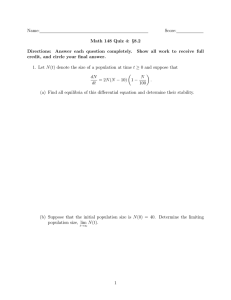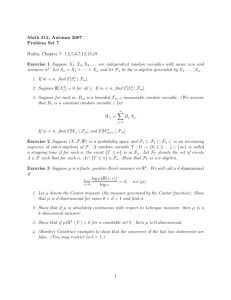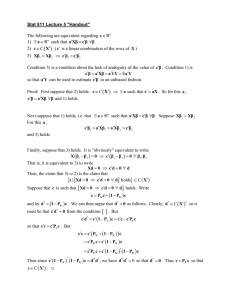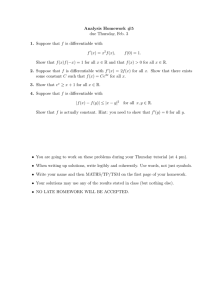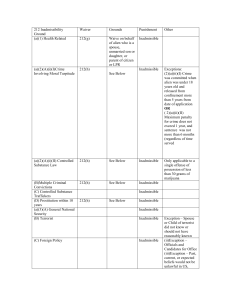STT 871-872 Preliminary Examination, August 2008
advertisement
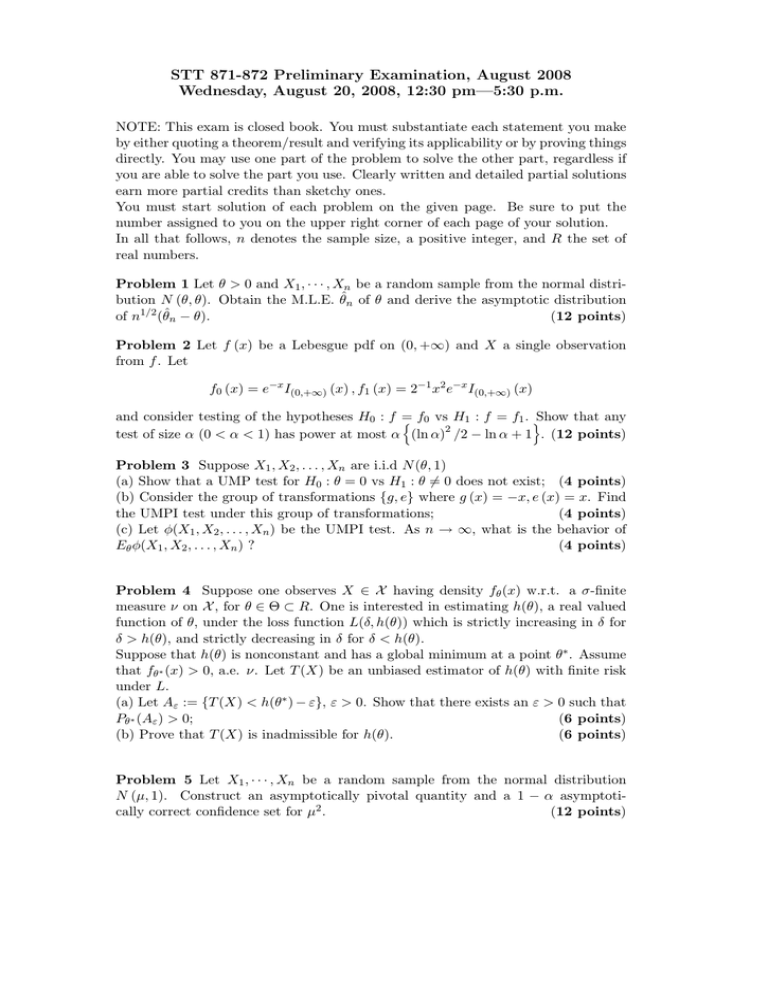
STT 871-872 Preliminary Examination, August 2008
Wednesday, August 20, 2008, 12:30 pm—5:30 p.m.
NOTE: This exam is closed book. You must substantiate each statement you make
by either quoting a theorem/result and verifying its applicability or by proving things
directly. You may use one part of the problem to solve the other part, regardless if
you are able to solve the part you use. Clearly written and detailed partial solutions
earn more partial credits than sketchy ones.
You must start solution of each problem on the given page. Be sure to put the
number assigned to you on the upper right corner of each page of your solution.
In all that follows, n denotes the sample size, a positive integer, and R the set of
real numbers.
Problem 1 Let θ > 0 and X1 , · · · , Xn be a random sample from the normal distribution N (θ, θ). Obtain the M.L.E. θ̂n of θ and derive the asymptotic distribution
of n1/2 (θ̂n − θ).
(12 points)
Problem 2 Let f (x) be a Lebesgue pdf on (0, +∞) and X a single observation
from f . Let
f0 (x) = e−x I(0,+∞) (x) , f1 (x) = 2−1 x2 e−x I(0,+∞) (x)
and consider testing of the hypotheses H0 : f =
n f0 vs H1 : f = f1 . oShow that any
test of size α (0 < α < 1) has power at most α (ln α)2 /2 − ln α + 1 . (12 points)
Problem 3 Suppose X1 , X2 , . . . , Xn are i.i.d N (θ, 1)
(a) Show that a UMP test for H0 : θ = 0 vs H1 : θ 6= 0 does not exist; (4 points)
(b) Consider the group of transformations {g, e} where g (x) = −x, e (x) = x. Find
the UMPI test under this group of transformations;
(4 points)
(c) Let φ(X1 , X2 , . . . , Xn ) be the UMPI test. As n → ∞, what is the behavior of
Eθ φ(X1 , X2 , . . . , Xn ) ?
(4 points)
Problem 4 Suppose one observes X ∈ X having density fθ (x) w.r.t. a σ-finite
measure ν on X , for θ ∈ Θ ⊂ R. One is interested in estimating h(θ), a real valued
function of θ, under the loss function L(δ, h(θ)) which is strictly increasing in δ for
δ > h(θ), and strictly decreasing in δ for δ < h(θ).
Suppose that h(θ) is nonconstant and has a global minimum at a point θ∗ . Assume
that fθ∗ (x) > 0, a.e. ν. Let T (X) be an unbiased estimator of h(θ) with finite risk
under L.
(a) Let Aε := {T (X) < h(θ∗ ) − ε}, ε > 0. Show that there exists an ε > 0 such that
Pθ∗ (Aε ) > 0;
(6 points)
(b) Prove that T (X) is inadmissible for h(θ).
(6 points)
Problem 5 Let X1 , · · · , Xn be a random sample from the normal distribution
N (µ, 1). Construct an asymptotically pivotal quantity and a 1 − α asymptotically correct confidence set for µ2 .
(12 points)
Problem 6 Let a parameter θ ∈ Θ = (1, 2) and Y1 , · · · , Yn a random sample from
U (θ, 2θ). Suppose that instead of Y1 , · · · , Yn one observes X1 , · · · , Xn which are
(
Xi =
2 Yi > 2
.
Yi Yi ≤ 2
(a) Denote the σ-finite measure ν = δ + m in which δ is the point mass measure
at {2} and
Show that the pdf of X1 with respect to ν is
³ m the
´ Lebesgue
³ measure.
´
2θ−2
1
fθ (x) =
I{2} (x) + θ I(θ,2) (x);
(8 points)
θ
Pn
−1
(b) Let R = i=1 I (Xi = 2), show that the UMVUE of 1−θ based on X1 , · · · , Xn
is n−1 R/2.
(6 points)
Problem 7 Let (xi , Yi ) , i = 1, 2, ..., 2n be bivariate data with xi = i/2n, i =
1, 2, ..., 2n and
Yi = β10 + β11 xi + εi , i = 1, 2, ..., n,
Yi = β20 + β21 xi + εi , i = n + 1, 2, ..., 2n
where εi , i = 1, ..., 2n. are iid from N (0, 1).
³
´
(a) Give the explicit formulae of the LSE β̂ = β̂10 , β̂11 , β̂20 , β̂21 of the vector of
parameters β = (β10 , β11 , β20 , β21 );
(6 points)
(b) Show that β̂10 and β̂21 are independent.
(6 points)
Problem 8 Let X be a single observation from Γ (α, γ) with α > 0 known and one
©
ª2
wishes to estimate γ > 0 under the loss L {γ, T (X)} = 1 − T (X) γ −1 .
(a) Show that the generalized Bayes estimator with the improper prior π (γ) = γ −2
is T∗ (X) = X/ (α + 2);
(6 points)
(b) Show that T∗ (X) is inadmissible.
(8 points)
2
